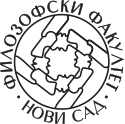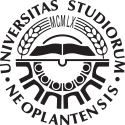| Course title |
Career Development and Business Ethics |
| Acronym |
15KSAP11 |
| Study programme |
Conference Interpreting and Translation |
| Module |
|
| Type of study |
second degree master academic studies |
| Lecturer (for classes) |
|
| Lecturer/Associate (for practice) |
|
| Lecturer/Associate (for OTC) |
|
| ESPB |
4.0 |
Status |
|
| Condition |
none |
Oblik uslovljenosti |
|
| The goal |
The aim of this course is the development competencies and skills necessary for a successful career in translation, introduce the students to the professional and legal responsibilities of a translator, and to the organizational, legal and financial aspects of translation profession. Special emphasis is put on the issue of ethical responsibility, abiding by rules of profession, ethical and legal aspects and the role of a translator in a society. |
| The outcome |
Students will gain theoretical and practical knowledge about organizational, legal and financial aspects of translation as a profession. Students will be able to perform translation assignments professionally, as they will possess necessary translation and interpreting skills. Students will become familiar with various translation briefs in different areas of translation. Student will be aware of the necessary skills for successful and ethical completion of a translation assignment. |
| Contents of lectures |
Weekly topics: (1) Translating profession in a wider social context; (2) Competencies of a translator (personal qualities and abilities); (3) Translation standards (situation analysis and the application of professional standards on work market); (4) Generally accepted norms of conference translation; (5) Norms of politeness in conference translation (translator’s body posture, voice, mime, mood, dressing culture); (6) Basic ethical principles of the profession (translator’s responsibility and code of conduct); (7) Potential ethical dilemmas (case studies); (8) Independent career planning (organizational, legal and financial aspects); (9) The role, importance and application of computer technology at the beginning of a career in translation and interpreting; (10) Time management. Elements of a translation contract. Price formation; (11) Professional development and specialized training. Specialized societies; (12) Current trends in translation profession. |
| Contents of exercises |
Students learn how to open a translation agency, how to make an electronic presentation of their agency, how to make an offer for a translation job, how to apply to a tender, how to behave while performing translation assignment, how to form the price, how to write an invoice. |

